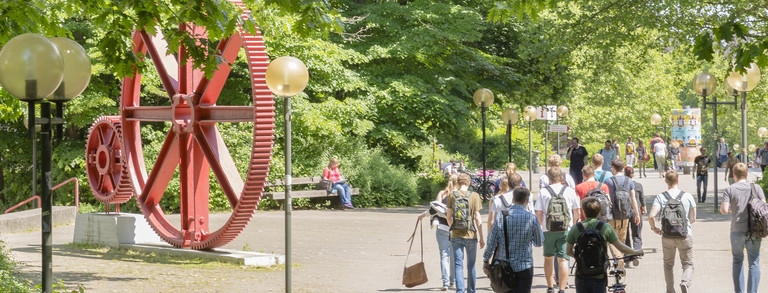Project „City Vision 2050: Designing the Future“
The project “City Vision 2050: Designing the Future” is an interdisciplinary project at the TU Dortmund University under the direction of the chairs of Urban, regional and international economics (URI) and Finance, funded by “Stiftung Innovation in der Hochschullehre”.
The focus of the project is the development of an urban planning game that represents an average German city. Within the framework of the game, a variety of urban functions and actors are to be modeled. In the end, players should make interactive decisions that help their city to be livable for its fictional inhabitants. This includes, for example, solutions for traffic problems, a prospering economy, but also the containment of environmental problems. A special feature of the game is that all behaviors are based on scientific findings and have been derived from the planning and economic literature.
The final game will be available to students of economics, business mathematics/informatics and spatial planning. The interactive planning game environment models and illustrates the interactions between the various stakeholders and the direct effects of economic policy measures through model-oriented work and game-based learning.
In the course of the project, students are repeatedly involved in the development of the game as part of courses. For example, scientific contributions to various interrelationships are developed as part of the M-project at the Faculty of Spatial Planning. The insights gained from the stakeholder analysis and the assessment of measures are then embedded in the simulation game. In this way, students contribute to deciding how, for example, the economy and the residents of the city react to political measures such as speed limits or similar.
In the course of the bachelor's program in the summer semester, the simulation is played with the integrated measures and interdependencies.
Students are also involved in the development process as part of seminars offered in economics and spatial planning in the respective bachelor's programs. In these seminars, certain functions are tested. Students make decisions that shape life in the city and influence the various stakeholders. With each decision, it is possible to directly experience how economic policy measures and urban planning interventions affect the various stakeholders and what complex interactions arise in the process.
Join us as we work together to design the 2050 Urban Vision and thus not only shape your skills but also the future of our cities!
Our project team is interdisciplinary in the spirit of the project. Here we briefly introduce ourselves:
Kira Schönhütte studied business mathematics at the TU Dortmund. In the project, she is responsible for content development and operational issues. She models the effects of (political) shocks on the city and its stakeholders based on the latest scientific findings.
Andere Dominguez graduated in mathematics at the University of the Basque Country. In the Freiraum project, she is responsible for programming, visual design and all other technical matters.
Katharina Herrmann is studying in the Department of Educational Science and Psychology at the TU Dortmund. She is in charge of the pedagogical concept of the teaching game and otherwise supports the team in scientific research and implementation.
Dr. Daniel Neukirchen received his doctorate from the Faculty of Economics in the field of finance. He is the project manager together with Dr. Vanessa Hellwig. He contributes to the project with his expertise in the field of financial modeling and simulations.
Dr. Vanessa Hellwig completed her doctorate at the Faculty of Spatial Planning. She is co-project manager with Dr. Daniel Neukirchen. She contributes to the project with her expertise in the field of empirical research on the location structures of cities and their economic structures.


